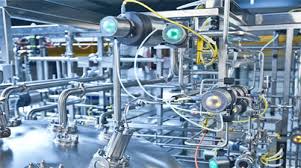Introduction:
Process control systems play a crucial role in the seamless operation of factories and plants, ensuring efficiency, safety, and sustainability. These intricate systems serve as the backbone of industrial processes, orchestrating the functions of various machines, sensors, flows, and reactions to guarantee optimal manufacturing outcomes. In this article, we will delve into what process control systems are, their fundamental functions, and the significance they hold in the landscape of modern industry.
Key Components and Functions:
Sensors and Instruments:
- Process control systems integrate a myriad of sensors and instruments that continuously collect data from the manufacturing environment. These sensors monitor variables such as temperature, pressure, flow rates, and chemical compositions.
Data Acquisition:
- The collected data is processed through data acquisition systems, which convert raw sensor information into usable digital data. This information serves as the basis for decision-making within the control system.
Control Algorithms:
- Control algorithms, embedded in the software, interpret the acquired data and make real-time decisions to adjust various parameters. These algorithms ensure that the process operates within predefined parameters to achieve optimal efficiency and product quality.
Actuators:
- Actuators are responsible for executing the adjustments suggested by the control algorithms. These could include adjusting valve positions, altering motor speeds, or controlling other devices to maintain the desired process conditions.
Human-Machine Interface (HMI):
- An essential component of process control systems is the HMI, which provides a user-friendly interface for operators. It displays real-time data, alarms, and allows operators to intervene or make manual adjustments when necessary.
Uses of Process Control System:
Optimizing Efficiency
Process control systems are essential for maintaining the quality and efficiency of manufacturing lines. They constantly check key parameters such as temperature, pressure, and flow rates. If any of these deviate from the desired range, the system automatically adjusts them to restore the balance. This way, the system ensures that the production runs smoothly, the equipment operates safely, and the costs are minimized. Process control systems are a smart way to optimize the performance of industrial processes.
Ensuring Safety and Reliability
Process control systems are essential for ensuring the safety and efficiency of chemical plants. They monitor and adjust various parameters, such as temperature, pressure, flow, and composition, to keep the chemical reactions within optimal ranges. By doing so, they prevent the occurrence of unwanted events, such as explosions, leaks, or shutdowns, that could result from sudden deviations or failures. Process control systems operate continuously and autonomously, providing reliable protection even when human operators are not present.
Enabling Flexible Automated Manufacturing
Process control is essential for new smart manufacturing methods. These methods are part of Industry 4.0, which uses internet-connected sensors to track every aspect of manufacturing. The sensors send data to computers that run advanced algorithms. These algorithms can adjust flows, temperatures, and machine settings to improve production. They can also detect problems and reconfigure equipment in real-time to change the type or output volume of products. This flexible automation makes production more efficient and responsive.

Supporting Sustainability
Process control systems promote sustainability and environmental responsibility in several ways. Their optimization minimizes wasted supplies and energy used per output unit. Tight control over chemical flows, reactions, and recycling loops reduces pollution and waste products. Connected sensors allow operators to catch emission spikes early. Overall, these capabilities let industries meet green objectives and regulations through smarter, cleaner production techniques.
Enabling Remote Monitoring and Control
New interfaces enable process control systems to be accessed and modified remotely via the internet. Live data from sensors is transmitted to servers that are located outside the plant premises, providing plant managers with a visual representation of their facility on their computer screens. Remote engineers can use this data to troubleshoot and resolve problems. Some systems even leverage artificial intelligence to predict issues before they happen. The aim of this technology is to reduce downtime and save money through proactive action.
To know more about Process Control System Click Here
Conclusion:
Process control systems are the essential technology that enables factories to operate smoothly, securely, sustainably, and effectively. They coordinate the many interrelated measurements that determine a successful manufacturing process. Process controls are advancing rapidly with new features like remote monitoring, automation adjustment, and artificial intelligence. These sophisticated systems will increase in relevance as industries rely more on connected, flexible, and optimized production methods. Although largely invisible, process controls facilitate modern manufacturing through their tech-enabled synchronization.
Discover more from WireUnwired Research
Subscribe to get the latest posts sent to your email.




